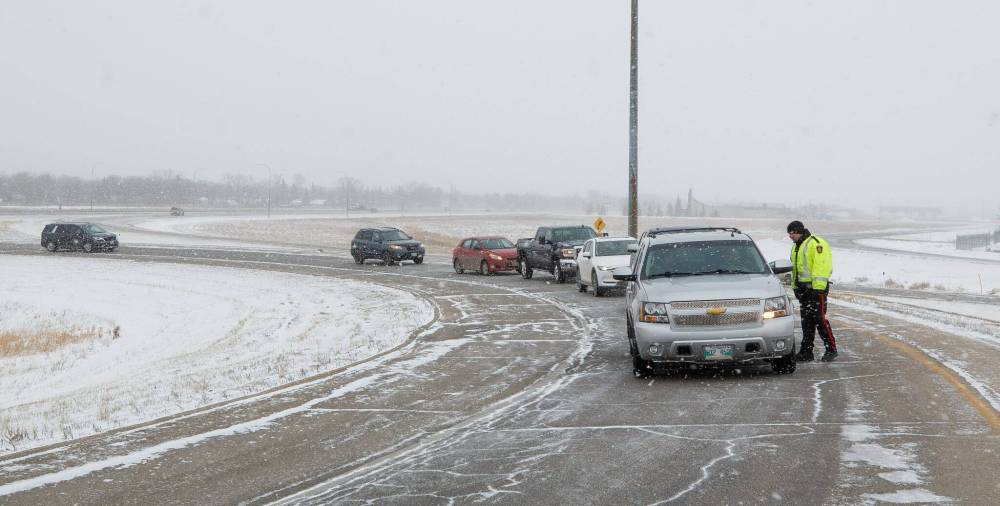Winnipeg police are sounding their sirens over an “alarming” increase in impaired drivers on city streets this holiday season — including two who were passed out behind the wheel.
Officers arrested 35 impaired drivers through the Winnipeg Police Service’s annual holiday checkstop program last week — roughly half of what they encountered during the entirety of the month-long initiative last year.
“We’re coming across all kinds of impaired drivers,” said Patrol Sgt. Stephane Fontaine, impaired driving countermeasures co-ordinator for WPS. “We’re coming across some that are clearly not listening to our messaging.
“They’re choosing to drive well beyond impairment and into intoxication.”

MIKE DEAL / FREE PRESS FILES
Officers arrested 35 impaired drivers through the Winnipeg Police Service’s annual holiday checkstop program last week.
Police posted the statistics to Facebook Tuesday, suggesting that “this isn’t just a safety concern” but rather “a call to action.”
Six of the 35 alleged impaired drivers were arrested on criminal charges, while the other 29 were handed immediate roadside suspensions.
In one case, a motorist continued to drive, sideswiping several parked cars.
In another, an impaired driver had a five-year-old child in the back seat, police said.
“We’re extremely disappointed and concerned that the message is not coming across and getting to these people,” Fontaine said.
Jordyn Reimer’s mother Karen told the Free Press that seeing numbers such as the ones police reported this week only leads to more trauma for families who have lost someone to an impaired driver.
Jordyn, 24, was killed on May 1, 2022, after a drunk driver blew a stop sign in Transcona while she was on her way to pick up a friend.
“People have to understand that if you’re going to drink, make alternative arrangements, and today that’s pretty simple,” Reimer said. “There are so many options. And it’s very upsetting that it keeps going on and on.”

RUTH BONNEVILLE / FREE PRESS FILES
Jordyn Reimer’s parents Karen and Doug Reimer stand with collages made up of photos of their daughter, Jordyn, who was killed by an impaired driver.
Police didn’t speak in detail about the recent cases, but Fontaine said there have been incidents of people passed out behind the wheel in traffic, ditches, snowbanks and parking lots, with drivers unable to explain how or when they got there.
Fontaine said everyone has to play their part in prevention efforts.
“That means if you come across someone or you’re out with a friend and they’re consuming and deciding to drive, everyone in society has the onus to say something and step up and prevent them from driving in the first place.”
Reimer agreed wholeheartedly.
The family continues fighting to hold a second person accountable for their daughter’s death.
Tyler Scott Goodman, who was behind the wheel that night, was sentenced to seven years behind bars in late 2023 after pleading guilty to impaired driving and failing to stop at the scene.
Reimer believes the individual who returned Goodman’s keys after they were taken away from him is just as responsible for her daughter’s death.
“That person was legally and morally culpable and responsible for contributing and setting the tragedy in motion that caused Jordyn’s death,” she said.
Police say numbers highlight program’s importance
Fontaine, meanwhile, said the recent numbers from their latest round of checkstops only highlight the importance of the program.
The difference between life and death in a collision can be just a matter of seconds, he said.
“It puts us out there, and we’re able to intervene before anyone gets killed or seriously hurt,” he said.
Winnipeg police adopted a mandatory screening model this year, bringing their process in line with RCMP, which requires everyone stopped to provide a breath sample.
Legislation has allowed for mandatory samples since 2018.
“Some of the people we are catching we likely wouldn’t have chosen to test, going by our standard suspicion-based demands, which means mandatory alcohol screening is 100 per cent doing its job,” Fontaine said. “It’s allowing us to detect impaired drivers, especially the ones that are more difficult to detect.”
Earlier this month, the provincial government introduced a bill that would carry tougher penalties for those convicted of impaired driving offences that result in injury or death.
The bill would impose a lifetime licence suspension on a driver convicted of two such offences within 10 years.
The current legislation hands out a 10-year suspension for a second offence, and a five-year automatic licence suspension after the first.
The proposed amendment to the Highway Traffic Act would also prohibit those convicted of these offences from driving with any alcohol in their blood for seven years following a first offence.
A second conviction would turn that into a lifetime prohibition.
scott.billeck@freepress.mb.ca

Scott Billeck
Reporter
Scott Billeck is a general assignment reporter for the Free Press. A Creative Communications graduate from Red River College, Scott has more than a decade’s worth of experience covering hockey, football and global pandemics. He joined the Free Press in 2024. Read more about Scott.
Every piece of reporting Scott produces is reviewed by an editing team before it is posted online or published in print — part of the Free Press‘s tradition, since 1872, of producing reliable independent journalism. Read more about Free Press’s history and mandate, and learn how our newsroom operates.
Our newsroom depends on a growing audience of readers to power our journalism. If you are not a paid reader, please consider becoming a subscriber.
Our newsroom depends on its audience of readers to power our journalism. Thank you for your support.